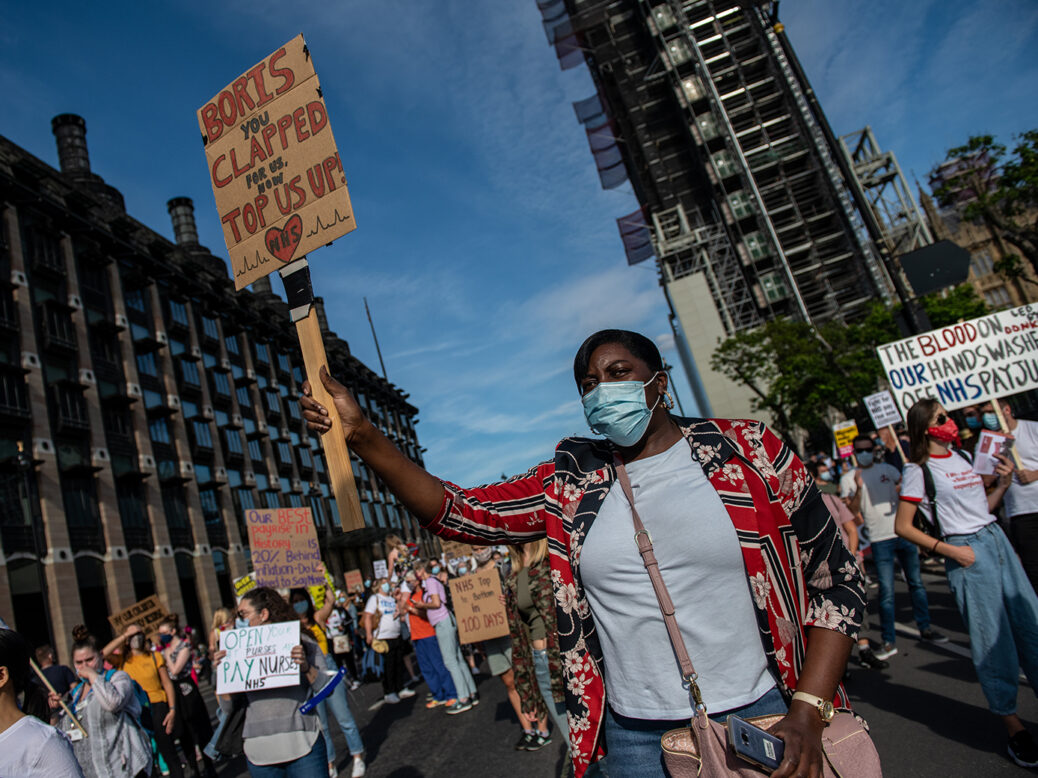
When the governor of the Bank of England, Andrew Bailey, asked companies in February to exercise “pay restraint”, he did so because the Bank is tasked with keeping inflation low and stable, and it doesn’t want competition for jobs driving wages too high (which would push up the prices of goods and services, sending inflation still higher).
As was pointed out at the time, Bailey might also have asked companies to exercise “profit restraint” and keep prices down by accepting tighter margins, but that was obviously not going to happen because that’s not how capitalism works. And pay restraint isn’t going to happen either, because that’s not how job markets work. If a company needs HGV drivers or cyber security experts, it has two choices: pay for them, or go out of business.
There is one employer, however, that is strongly incentivised to pay workers less: the government. The spectre of uncontrolled inflation gives the government a reason not to inflate the pay of public sector workers (to keep the dreaded wage-price spiral at bay), which also saves on spending.
The problem for public sector workers is that private sector pay is inflating anyway, so the private sector’s wage-price spiral is, for nurses and teachers, just a price spiral. Inflation is hitting the most important workers the hardest.
This situation is particularly dangerous for the British public sector because it contains large numbers of workers who are chronically underpaid. In health, education and social care, there were already crises of recruitment and retention.
The Royal College of Nursing’s (RCN) 2021 employment survey found that almost one in five nurses were actively planning to leave their jobs. A survey of more than 10,000 teachers by the National Education Union (NEU) found that 35 per cent “would definitely be no longer working in education in five years’ time”.
[See also: What inflation and stagflation mean for the cost of living crisis]
These figures suggest a looming crisis in the provision of public services in the UK, and it is partly caused by pay. Teachers’ pay in the UK fell against inflation by 19 per cent from 2010 to the end of 2021, according to the NASUWT, whose members voted this morning (19 April) to mobilise for industrial action over pay. Nurses, too, have signalled they would support strike action; even with the 3 per cent pay increase proposed by the government, a nurse at the top of Band 5 will be £935 per year worse off after this month’s National Insurance rise (which is designed, ironically, to benefit the NHS) combined with annual inflation of 8 per cent, according to the RCN.
Teaching and nursing are professions that require a degree, but pay relatively little. A new nurse on the Band 5 starting salary (currently £25,655) takes home less than £10 a day more than a Sainsbury’s worker earning £11.05 per hour, but will have spent around £45,000 to train for their role.
The cost of having studied for a low-paying degree is also about to rise as a result of government plans to reduce the repayment threshold for student loans from £27,295 to £25,000 and extend the loans over 40 years. Under these proposals, a new nurse starting next year will begin paying for their student loan (which rises, unlike their salary, with inflation) from day one of the their jobs, and continue paying for it, in many cases, until they are in their 60s.
For both nurses and teachers, research by the House of Commons Library suggests the reforms to student finance will cost an extra £10,000 to £15,000 per person over their career, and the total repayments of some nurses could more than triple.
Unlike in the private sector, where a company may expand or contract, the UK public sector cannot allow demand to go unanswered – it cannot get smaller without the work being picked up by someone else. This means every nurse or teacher who leaves has a compounding effect: in the RCN and NEU surveys, workload and class sizes are at the top of the list of the factors driving these people out of the workforce.
Despite increasingly elastic standards, the promise of an influx of cheap workers from overseas is unlikely to plug the gaps in the public sector. NHS trusts are already so concerned with retention of the nurses that they recruit from the Philippines and India that they are reportedly forcing them to remain with contracts that charge high fees if they try to leave.
The pandemic should have been a sharp lesson in the jobs we need and the jobs that can be paused. When the nation’s management consultants and brand directors were kept from the office (or furloughed entirely) we somehow muddled through. When schools closed and healthcare was restricted, children experienced permanent damage to their schooling, vulnerable teenagers disappeared from education and tens of thousands of people died in their homes.
This lesson does not appear to have been learned. A chancellor who sees high public spending as “immoral” does not appear to recognise that inflation is a greater danger to key workers, and the UK risks running out of people to do jobs that are much more valuable to society than others.
[See also: Five ways the government failed to shield the UK from inflation]





